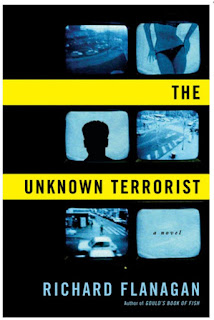The Unknown Terrorist
I am very intrigued by writers who seem to be able to shift gears so dramatically. Richard Flanagan’s The Unknown Terrorist is like a Stephen King novel, skilfully written as a genre piece, almost with the trace of the author’s style. If you are a fan of Flanagan’s earlier books, particularly Death of a River Guide and Gould’s Book of Fish, then you will scarcely recognise the prose. But form suits the message here. Flanagan is writing for a wider audience, and he wants to give them a very clear message: we construct our own monsters, from our own fears. This is a case of using a popular form of fiction to portray an unpopular idea; the irrational fears that beset us make us vulnerable to manipulation by government agencies bent on power, and media outlets bent on profit.
I wondered whether the title, ‘The Unknown Terrorist’ is
something of a play on W. H. Auden’s famous poem, ‘The Unknown Citizen’. Auden
writes about a man who has done nothing wrong, and indeed, is a modern saint in
terms of his quiet compliance and service. His very blandness does him the
credit of being one who causes no fuss; his opinions are predetermined. The
poem ends with the sad fact that behind this life, there is little joy: “Was he free? Was he happy? The question is
absurd:/Had anything been wrong, we should certainly have heard.”
The unknown citizen in Flanagan’s hands is a poll dancer,
who has left her western-suburbs life behind and has attempted to be invisible through
a fixation of celebrity fashion and style that has allowed her to remain hidden
in plain sight. She earns her money in cash, literally keeping $100 bills in
the roof of her apartment, avoiding the tax man and the fixed identity of
banks, tax offices and so on. And yet her dreams are those of the everyman – to
save enough for a deposit on her own apartment, as the first, slippery step towards a horizon of freedom and happiness. For now, she is content to
dance her way forward, being less demeaning in some respects than the
nine-to-five grind of low paying she has tried in the past. The Doll’s views of
the world are uninformed and prejudiced (“I’m equally racist about everybody,”
she would say, “but slimy lebs I really hate” p.11).
Flanagan takes this unformed character and places her, by a
whim of fate, in the midst of a terrorist scare. After dancing her shift at The
Chairman’s Lounge, she meets Tariq, an exotic stranger with bland-luxurious
goods and an equally unknown life in a high-rise with city skyline views. They
have a night together, and then the Doll becomes the mysterious figure linked
to a terrorist suspect. Whether Tariq is anything more than a mid-level drug or
people smuggler is never really made clear, though it seems likely that the
terrorist charge is trumped-up. As for the Doll, she becomes a much-hated
figure as a desperate media figure, Richard Cody, takes revenge on her
rejection of his sexual advance and through the dark arts of reconstruction,
turns her into the “unknown terrorist”. Although not Muslim, the narrative
runs, the Doll is disaffected and has become the internal enemy that is the
next phase of terrorism, as events in Bagdad and Kabul turn slowly, inevitably,
towards self-destruction at home.
To say much more about the characters or plot would be to
give too much away, for Flanagan uses a simple thriller technique of labelling
the sections of the book by days of the week and building the level of tension
that literally reaches its crescendo on a hail-stone evening when the heat is
finally released in apocalyptic stones falling from the sky on the city of
glass. The Unknown Terrorist wears
its politics on its sleeve, and could be criticised for its caricature of the
media, government agencies and corrupt police (at least in terms of the figures
that represent them). On the other hand, it makes a simple point well, and it
is an important message for us all to consider. Do we create our terrorists, at
least our home-grown ones, through some sort of pathological need to experience
fear and terror, or are we at least complicit in their popularisation, if not
their fermentation? I’d call this an important book for the here-and-now,
rather than a book that will necessarily become part of the works which I think
Flanagan will be remembered by in the longer term. And that, it seems to me, is
a very good use of popular fiction – to sell books, yes, but to engage in
important ideas at a popular level, as good crime and thrillers do.
(See also my thoughts on First Person, The Living Sea of Waking Dreams, The Narrow Road to the Deep North).




Comments
Post a Comment